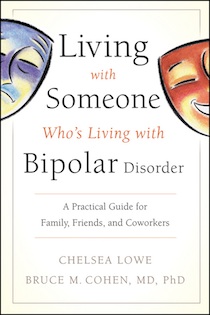 Today I have the pleasure of interviewing Bruce Cohen, M.D., Ph.D, who is Director of the Harvard University McLean Psychiatric Hospital and Professor of Psychiatry at Harvard Medical School. He is also the coauthor, with Chelsea Lowe, of the recently released book, “Living with Someone Who’s Living With Bipolar Disorder: A Practical Guide for Family, Friends, and Coworkers.” Cohen lives in the Boston area.
Today I have the pleasure of interviewing Bruce Cohen, M.D., Ph.D, who is Director of the Harvard University McLean Psychiatric Hospital and Professor of Psychiatry at Harvard Medical School. He is also the coauthor, with Chelsea Lowe, of the recently released book, “Living with Someone Who’s Living With Bipolar Disorder: A Practical Guide for Family, Friends, and Coworkers.” Cohen lives in the Boston area.
Question: I have always maintained that the best thing a person can do to support a bipolar loved one is get educated. But if you could offer folks a crash course, what are the five most important things you think a loved one should know about bipolar disorder?
Dr. Cohen: Getting educated is good advice. Here are five important things everyone dealing with bipolar disorder should know:
1. Bipolar disorder is an illness, with risk determined by genes and environment, like other medical illnesses. All medical illnesses affect mood, thinking and behavior, but there is always much more to the person than the illness.
Question: Suppose a mentally ill loved one or friend doesn’t want to get help, then what do you do?
Dr. Cohen: Don’t give up. At appropriate times, kindly and patiently talk with your loved one or friend about what you are seeing and why it is worrying you and remind them that getting an evaluation doesn’t mean deciding on treatment. If your loved one or friend is in immediate danger from illness, don’t be afraid to call for help from professionals, including the police.
Question: Can you offer any guidance to folks regarding how they should approach so many choices with medication? For example, I found that the older drugs worked better for me, but many of the psychiatrists I saw only wanted to work with the newer ones. Do you have any insight with regards to how to get the best treatment?
Dr. Cohen: Each person responds differently to medications, and it is important to find an expert who knows the options and will spend the time to work with you to find the right personalized treatment. An appropriate expert in bipolar disorder will know how to use both old and new drugs. If you are not satisfied with your treatment or comfortable with your doctor, seek a consultation or find another doctor.
* Click here to subscribe to Beyond Blue and click here to follow Therese on Twitter and click here to join Group Beyond Blue, a depression support group. Now stop clicking.

